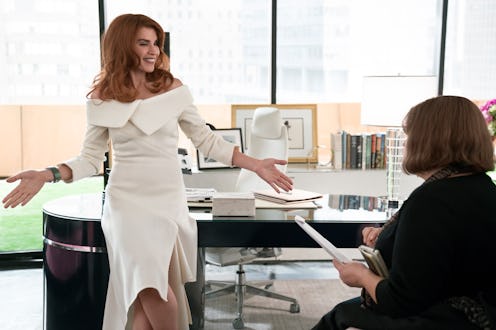Entertainment
The Magazine In ‘Dietland’ May Remind You Of What Your Teenage Self Used To Read

Art tends to reflect the culture at large, so it’s not surprising that #MeToo has crept into Hollywood’s consciousness already. The latest drama to make reference to the cultural zeitgeist is Dietland, premiering on June 4, in which Plum (Joy Nash), a woman who struggles intensely with her self-image, is inspired to fight for the greater good – in a pretty extreme way. She works for a trendy teen publication, but is Daisy Chain from Dietland a real magazine?
Dietland, based on the book of the same name, follows Alicia “Plum” Kettle through her everyday life. She has a cool job as an advice column ghostwriter, but she feels terrible about herself because she doesn’t have the willowy figure she sees in all the magazines (including the one she works for). In the book, Plum is trying to save up for gastric bypass, as if that is the only solution to all of her problems. But Plum, of course, is greater than the sum of her parts, and that’s what she’ll have to learn in order to finally accept herself. But on the way to acceptance, she has to go to work at the offices of Daisy Chain every day. Or else, you know, she’ll get fired.
Daisy Chain is not a real, full-fledged teen magazine, however. A website and social media links exist for the magazine, but they're promoting Dietland and not giving tips on prom dresses for actual teens. You can, however, take a quiz to determine which Dietland character you are and ask a question of "Dear Kitty," the column Plum ghostwrites. All of the social channels link to author Sarai Walker’s channels, who wrote the novel the series is based on.
So what can viewers expect of Dietland? Well, it’s helmed by Marti Noxon, the woman behind shows like Buffy The Vampire Slayer and UnREAL, so suffice it to say that Dietland will not shy away from telling the tough stories. “It’s absolutely empathy propaganda,” Noxon told the New York Post about the series. “People who don’t feel empowered have a lot less security about who they are. They’re constantly trying to please the eye of the beholder.”
Nash echoed this idea, saying that, as an actor and a model, she had to make her body work for her, not for other people. And as soon as she did, work came in. “I worked as a fit model for a long, long time. Not in print but as a live mannequin for plus-size designers,” she said in the same New York Post article. “And it really divorces who I am from my body when I’m standing there and they’re deciding whether to hire you and they say, ‘She has a belly. So that’s good.’ And they hire me because of my belly. I can’t hate it. It got me a job where I get paid $125 per hour to stand there.”
This idea of resistance – one that is relevant in today’s political and social climate – is important to Dietland. When you see something you don’t like, how do you change it? In an interview with the Los Angeles Times, Noxon said, “I remember pitching [the show] on a day when [Donald Trump] was mocking a contestant from one of his beauty pageants for being fat, and I thought, ‘Well, this show will probably still be relevant when Hillary Clinton is president.’” Though Noxon got one-half of that equation wrong, she's right about one thing — women standing up and demanding to be respected and accepted as they are is something that is never going away. Not anymore.
Julianna Margulies, who plays Plum's self-absorbed boss Kitty on Dietland, also told the Los Angeles Times that women are mad as hell, and they're not going to take it anymore. “The backdrop of our show is the #MeToo movement before it was the #MeToo movement,” she said. “The Jennifer movement [the group of women who punish men who have sexually assaulted women] in the show is definitely a vigilante movement. I would hate for anyone to copy any of it. But the fact that women are finally taking the law into their own hands and saying, ‘You know what? Screw this. These guys sexually abused these women, we’ll take care of them because you’re not doing anything’ — I think that’s what we’re seeing right now. Women have had it.”
And it leads to some interesting questions — is vigilante justice ever the answer to inspiring some serious change? Or are protesting and letter writing and amassing in the streets enough to make an impact? The revolution will come, and it will probably come in both extremes — in Dietland, Noxon, Margulies, and Nash are ready to explore them and weigh them in their own way, and fans will see which justice-seeking method comes out on top.